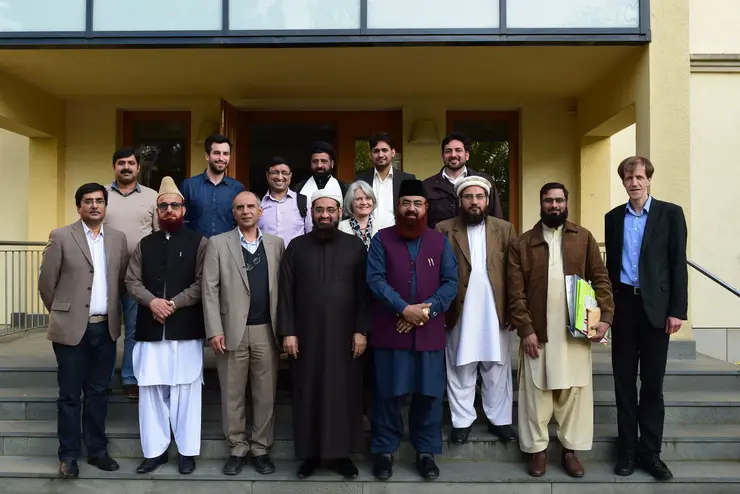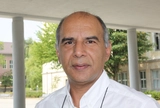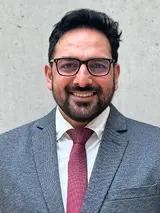Religious Pluralism & Religious Plurality: towards an ethics of peace
You can find information in Urdu on our german site.
Research cum Dialogue Project (2016-17)

In January 2016, the Chair of Muslim Cultural & Religious History (CMCRH), University of Erfurt initiated a new research-cum-dialogue project titled ‘Religious Pluralism & Religious Plurality: towards an ethics of peace’. This academic endeavor invites male and female students from religious seminaries from Pakistan to participate in workshops at the University of Erfurt.
Over the course of two years, the CMCRH will host three major workshops on the topic of
(i) Questions of Historiography
(ii) Social Sciences & Religion
(iii) Human Rights and the Contribution of Religions
These workshops are carefully designed in order to deal with the issue of religious (in)tolerance from the perspective of social, cultural and religious studies, and the participants are encouraged to advance their own solutions from within their traditions while also employing the scientific tools and epistemological insights provided during the workshops.
One of the unique aspects of these workshops at the University of Erfurt is its sustainability effect as every workshop conducted in Erfurt University will be followed up with a similar workshop that madrasa students will be encouraged to conduct in their own seminaries in Pakistan. This exercise in cultural translation is of immense importance as it will bear the potential to put into practice the knowledge acquired in Germany.
Project Profile
Rationale
In contemporary history, madrasas have played a significant role in configuring Muslim religious thought and their contributions have been momentous in shaping new political identities and structural changes in society. In the context of South Asia, the knowledge tradition of Dars-e Nizami has been an important factor in serving as a socio-religious framework for various dominating schools of thought such as the Deobandi, Barelvi, Ahl-e Hadith, Shiite traditions, and Jamaat-e Islami. In fact, madrasas established during the late 19th and 20th centuries produced several luminaries that left a strong impact on South Asian cultures, even at the state level. This may be credited to the fact that in terms of curricular approach, Dars-e Nizami was highly pragmatic, pluralistic and divergent in nature.
While madrasas have continued to inspire ideologies, nation-building processes and/or socio-religious movements, at the same time these places of learning have shared a complex relationship with the state. This holds particularly true in the context of geo-political world order that has been shaped over the past two decades as madrasas have received worldwide attention, particularly in Pakistan. Contrary to popular assertion spread by media and scholarship alike that the education received in madrasas can be limited in scope, there is credible evidence to suggest that madrasas rather introduce their students to philosophy, law, science, ethics, languages and of course religious education, harkened back to the tradition of pluralism and the ethics of ikhtilaf or constructive conflict.
At the Chair of Muslim Cultural & Religious History in the Faculty of Humanities, University of Erfurt, we believe and argue that educational training in madrasas has a strong potential to create inter- and intra-faith harmony. In order to fully utilize this potential, the collaboration of University of Erfurt with all five major schools of thought in Pakistan aims to create a frame of reference to further extend and highlight the prevalent tradition of tolerance in madrasas and the management of disagreement. Such collaboration will also provide a strong potential for western academia to learn from the knowledge repository available in madrasa curriculum such as the deeply anchored Islamic jurisprudence, akhlaq tradition, Sufi discourses and Hadith studies. We believe that these scholarly traditions can therefore ascertain each other by acknowledging the values of peace and religious pluralism, while appreciating religio-cultural diversity and coexistence.
It is with this motivation that the Chair of Muslim Cultural & Religious History at the University of Erfurt wishes to collaborate with all major schools of thought in Pakistani religious seminaries and to conduct joint workshops for their students. These workshops are expected to deal with the issue of religious (in)tolerance from the perspective of social, cultural and religious studies. The participants in the planned workshops will be encouraged to advance their own solutions from within their traditions while also employing the scientific tools and epistemological insights provided during the workshops.
Objective
This project seeks to collaborate with madrasa students as well as potential future leaders within the society of Pakistan in promoting the values of justice, religious pluralism and appreciating religious diversity, while grounding the discussion primarily within Islamic traditions. Other academic efforts in Germany cater to the training of Imams or Muslim theologians within Germany, whereas at the University of Erfurt our effort is distinctively characterised in developing more space for religious pluralism, respect for disagreement and disaccords and an ethics of peace in the context of Pakistan. Moreover, an important aspect of our effort is to bridge the gap between mainstream higher education institutions in Germany and traditional education systems in Pakistan, as German and international students from the University of Erfurt will jointly take part in the workshops together with madrasa students.
In order to achieve the aims and objectives outlined above, the project will comprise a series of workshops and study excursions in Germany. These will include madrasa students, both male and female, from the major schools of thought as well as students from the University of Erfurt. By thus introducing the participants to different social and cultural perspectives, the participants will be encouraged to learn to appreciate and eventually analyse various religious practices and to reflect on them in the light of Islamic cultural articulations. In this context, it will be important to trace the traditional belief contents and symbols, initially, into their historical contexts of origin and then re-translate them in a responsible interpretation, so that, in a process of reflection and evaluation, they can be subjected to criticism, if necessary, and freshly adopted in a conscious second step.
In order to make our efforts more practical and sustainable, following each workshop in Germany, there will be corresponding post-workshop projects in Pakistan which the madrasa graduates themselves will design and conduct upon returning to their respective home institutions. This exercise in cultural translation is of immense importance, as these post-workshop ventures conducted in Pakistan will bear the potential to put into practice the knowledge acquired in Germany.
Workshops
- May, 2016: Agenda-Setting Workshop
- July, 2016: Questions of Historiography
- Oct, 2016: Post Workshop Projects in Pakistan
- Feb, 2017: Social Sciences & Religion
- July, 2017: Human Rights and the Ethics of Peace. The Contribution of Religions
- Oct, 2017:Post Workshop Projects in Pakistan
- Dec 2017: Project Review Meeting
Documentary
Press & Media Outreach
02.08.2017
Erfurt University holds 10-day workshop for Madrassa students of Pakistan
Source: Daily Pakistan, Global Edition (in English; web, pdf)
__________________________________________________________________________
29.07.2017
German university holds workshop for Pakistani seminary students.
Source: Daily The Nation (in English: masthead, news)
__________________________________________________________________________
21.07.2017
پاکستانی مدارس کے طلبا کی جرمنی میں یورپین طلباء کے ہمراہ ١٠ روزہ تعلیمی ، تحقیقی و تدریسی وورکشاپ کا اہتمام
Pakistani madrasa students participate in a 10 day educational and research workshop along with European students.
Source: Pakban International (in Urdu: web, pdf)
__________________________________________________________________________
21.07.2017
پاکستانی طلبہ کی جرمن یونیورسٹی میں دس روزہ تحکیکی اور تدریسی ورکشاپ
10 day research and educational workshop for Pakistani students at the German University
Source: Daily Jang (in Urdu: web, masthead, detailed news)
__________________________________________________________________________
12.07.2017
Auf Tuchfühlung mit anderen Kulturen
Source: Thueringer Allgemeine (in German: web, pdf)
__________________________________________________________________________
10.07.2017
Professur für Islamwissenschaft begrüßt Studierende aus Pakistan
Source: Uni Erfurt (in German, web, pdf)
__________________________________________________________________________
23.02.2017
Ten day workshop in Erfurt: participants from Pakistan also take part.
Source: Daily Jang (in Urdu, GIF, masthead)
__________________________________________________________________________
23.02.2017
Erfurt University's Chair Muslim Cultural & Religious History commences the research-cum-dialogue workshop with madrasa students from Pakistan
Source: Paak Baan International (in Urdu, GIF, websnap)
__________________________________________________________________________
10.02.2017
Ihr wird der Schleier vom Kopf gerissen und dennoch fühlt sie sich wohl
Source: Thueringer Allgemeine (in German, PDF)
__________________________________________________________________________
07.02.2017
Chair Muslim Cultural & Religious History, University of Erfurt welcomes the Pakistani students for workshop: Religion and Social Sciences.
Source: Uni Erfurt (in German, web)
__________________________________________________________________________
22.07.16
Building bridges - Pakistani madrassa pupils interact with German students
Source: Deutsche Welle (web)
__________________________________________________________________________
22.07.16
Ambassador of Pakistan receives Pakistani and Erfurtian guests
at Pakistani embassy in Berlin
Source: Facebook (web)
__________________________________________________________________________
21.07.16
University of Erfurt students receive guests from Pakistan
Source: Thüringen Landeszeitung (in German, PDF format, web)
__________________________________________________________________________
21.07.16
Students from Pakistan and Erfurt discuss religion
Source: Thüringen Allgemeine (in German, PDF format, web)
__________________________________________________________________________
19.07.16
Thüringen Minister for Culture and European Affairs appreciates the
need of dialogue project as an important aspect of intercultural
Source: Thüringen Staatskanzlei (in German, PDF format, web)
__________________________________________________________________________
15.07.16
Workshop on Questions of Historiography commences in Erfurt University
Source: Uni Erfurt (in German, web)
__________________________________________________________________________
03.07.16
Students of Pakistani religious seminaries visit Erfurt University
Source: Daily Jang (in Urdu, web)
__________________________________________________________________________
02.05.16
Chair of Muslim Cultural & Religious History receives the guests from
Pakistani religious seminaries
Source: Uni Erfurt (in German, web)
Project in Brief
Intermediate Outcomes
Project Outcomes
Promotion of values of justice, peace, religious pluralism and appreciating religious diversity
Intermediate Outcomes
- Knowledge enhancement and transfer for madrasa students within western academic traditions
- Training in inter and intra faith dialogue
- Respect for religious diversity by visits to sacred places.
- Cultural transfer and translation of knowledge by follow-up workshops in Pakistan
Participating Madrasas
Students from the following madrasas have taken part for all the three workshops held in Erfurt.
- Jamia Binoria, Karachi
- Dar al-Uloom Haqqania, Akora Khattak
- Khair al-Madaris, Multan
- Jamia al-Kauthar, Islamabad
- Dar al-Uloom Ghousia, Behra Shareef
- Jamia Nizamia Rizvia, Sheikhupura
- Jamia Nizamia Rizvia, Lahore
- Jamia Naeemia, Lahore
- Jamia Naeemia Sirajia, Lahore
- Dar al Uloom Naeemia, Karachi
- Aleemiyah Institute of Islamic Studies, Karachi
- Islamic University International, Karachi
- Jamia Salfia, Faisalabad
Beneficiary Details: Questions of Historiography (July 2016)
Workshop in Erfurt
Total Number of Participants from Pakistani Madrasas
- 11 Male and Female students
Participating Madrasas
- Jamia Khair al-Madaris, Multan
- Jamia Nizamia Rizvia, Lahore
- Jamia Naeemia, Lahore
- Jamia Naeemia Sirajia, Lahore
- Jamia Salfia, Faisalabad
- Jamia Markaze Uloom Al Islamia Mansoora, Lahore
Follow-up workshops in Pakistan:
Total Number of Participants from Pakistani Madrasas
- 77 Male and Female students
Beneficiary Details: Religion and Social Sciences (February 2017)
Workshop in Erfurt
Total Number of Participants from Pakistani Madrasas
- 13 Male and Female students
Participating Madrasas
- Jamia Naeemia, Lahore
- Jamia Naeemia Sirajia, Lahore
- Jamia al-Kauthar, Islamabad
- Dar al-Uloom Ghousia, Behra Shareef
- Aleemiyah Institute of Islamic Studies, Karachi
- Islamic University International, Karachi
- Jamia Binoria, Karachi
- Jamia Nizamia Rizvia, Sheikhupura
Follow-up workshops in Pakistan
Total Number of Participants from Pakistani Madrasas
- 89 Male and Female students
Beneficiary Details: Human Rights and Contribution of Religions (July 2018)
Workshop in Erfurt
Total Number of Participants from Pakistani Madrasas
- 14 Male and Female students
Participating Madrasas
- Darulum Haqqania, Akora Khattak
- Jamia al-Kauthar, Islamabad
- Dar al-Uloom Ghousia, Behra Shareef
- Islamic University International, Karachi
- Jamia Binoria, Karachi
- Dar al Uloom Naeemia, Karachi
- Jamia Nizamia Rizvia, Sheikhupura
- Jamia Naeemia, Lahore
- Jamia Naeemia Sirajia, Lahore
Follow-up workshops in Pakistan
Total Number of Participants from Pakistani Madrasas
- 90 Male and Female students
Project Staff
Team Assistans in Erfurt
- Ms. Faiza Hussain
- Mr. Jascha Rittmann
- Mr. Muhammad Usman Khan
- Mr. Tobias Lebens
Project Coordinator
Project Resource Persons in Pakistan
- Ms. Munazza Akram
- Mr. Muhammad Suleman
- Mr. Muhammad Saad Khan
Former resource persons
- Mr. Muhammad Salman
- Mr. Shams-ur-Rehman



